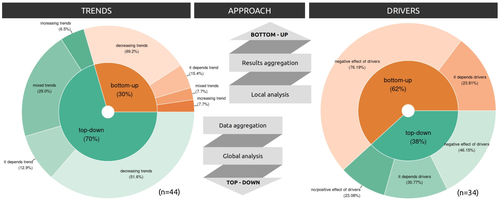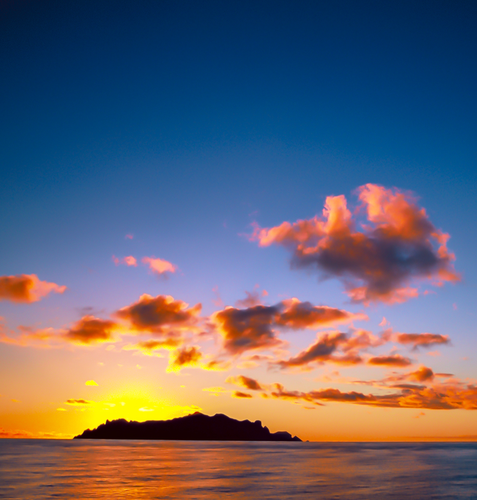
BORGES Paulo
- AZOREAN BIODIVERSITY GROUP, Universidade dos Açores; ce3c - Centre for Ecology, Evolution and Environmental, Angra Do Heroismo, Portugal
- Agroecology, Biodiversity, Biogeography, Community ecology, Conservation biology, Macroecology, Pollination, Taxonomy, Terrestrial ecology
- recommender
Recommendation: 1
Review: 1
Recommendation: 1

Sources of confusion in global biodiversity trends
Unraveling the Complexity of Global Biodiversity Dynamics: Insights and Imperatives
Recommended by Paulo Borges based on reviews by Pedro Cardoso and 1 anonymous reviewerBiodiversity loss is occurring at an alarming rate across terrestrial and marine ecosystems, driven by various processes that degrade habitats and threaten species with extinction. Despite the urgency of this issue, empirical studies present a mixed picture, with some indicating declining trends while others show more complex patterns.
In a recent effort to better understand global biodiversity dynamics, Boennec et al. (2024) conducted a comprehensive literature review examining temporal trends in biodiversity. Their analysis reveals that reviews and meta-analyses, coupled with the use of global indicators, tend to report declining trends more frequently. Additionally, the study underscores a critical gap in research: the scarcity of investigations into the combined impact of multiple pressures on biodiversity at a global scale. This lack of understanding complicates efforts to identify the root causes of biodiversity changes and develop effective conservation strategies.
This study serves as a crucial reminder of the pressing need for long-term biodiversity monitoring and large-scale conservation studies. By filling these gaps in knowledge, researchers can provide policymakers and conservation practitioners with the insights necessary to mitigate biodiversity loss and safeguard ecosystems for future generations.
References
Boennec, M., Dakos, V. & Devictor, V. (2023). Sources of confusion in global biodiversity trend. bioRxiv, ver. 4 peer-reviewed and recommended by Peer Community in Ecology. https://doi.org/10.32942/X29W3H
Review: 1

Scales of marine endemism in oceanic islands and the Provincial-Island endemism
Provincial-island endemism adds to our understanding of the geographical distribution of species
Recommended by Werner Ulrich based on reviews by Paulo Borges and 1 anonymous reviewerMany ecological, evolutionary, biogeographic studies on animals and plants have focused on endemism (e.g. (Crisp et al., 2001; Kier et al., 2009; Matthews et al., 2024, 2022; Qian et al., 2024). Ecological hotspots were first defined on endemic species (Myers et al., 2000). Nevertheless, despite the fact that the concept of endemism is crucial in biogeography and also in palaeontology there is still no stringent definition of endemism and very different concepts of endemism are used. It is another example of a concept that tries to define the undefinable (Darwin, 1859). ‘Definitions’ are either based on geographic and genetic isolation (Myers et al., 2000; Qian et al., 2024) or founded in geometric approaches that define restricted range sizes (Kinzig and Harte, 2000). Often, an ad hoc concept is used to cover taxon specificity and the habitats studied.
Pinheiro et al. (2025) focus on species restricted to oceanic islands and rightly remark that these work as cradles for species origination and also as museums that contribute to lineages persistence. However, they also notice that in the case of islands any definition of endemism from species occurring only on single islands would be too narrow. Rather, endemism shows a spatial scaling with an increasing number of species occurring of multiple islands. In this respect they introduce the concept of provincial-island endemism and study the importance of single and multiple-island endemic species to island biodiversity
Pinheiro et al. (2025) use data from 7,289 fish species associated with reef environments of 87 oceanic islands and 189 coastal reefs around the world. A strong negative correlation appeared between the number of endemic species and the number of islands they occur. This relationship directly translates into our assessment of whether an archipelago is rich or poor in endemics. Pinheiro et al. (2025) explicitly demonstrate this with the examples of the Hawaiian Islands and Rapa Nui. They conclude that biogeographers need to clarify whether they deal with single-island or multiple island endemics. We can adapt this distinction to terrestrial and freshwater habitats and differentiate between single and multiple restricted areas and water bodies, for instance rivers, lakes, alpine valleys, mountains, or deserts.
Of course, the idea that endemism patterns are scale dependent is not new. Daru et al. (2020), Graham et al. (2018), or Keil et al. (2015) already noticed the importance of spatial scale and Townsend Peterson and Watson (1998) introduced the partly equivalent concepts of weighted spatial and phylogenetic endemism that also contain the scaling component. Pinheiro et al. (2025) add to this by providing a sound analysis of the strength of the scaling component. They argue that fish endangerment categories and fishery limits might change when considering multiple island endemics.
References
Crisp, M.D., Laffan, S., Linder, H.P., Monro, A., 2001. Endemism in the Australian flora. J. Biogeogr. 28, 183–198. https://doi.org/10.1046/j.1365-2699.2001.00524.x
Daru, B.H., Farooq, H., Antonelli, A., Faurby, S., 2020. Endemism patterns are scale dependent. Nat. Commun. 11, 2115. https://doi.org/10.1038/s41467-020-15921-6
Darwin, C., 1859. On the origin of species by means of natural selection, or the preservation of favoured races in the struggle for life. John Murray, London.
Graham, C.H., Storch, D., Machac, A., 2018. Phylogenetic scale in ecology and evolution. Glob. Ecol. Biogeogr. 27, 175–187. https://doi.org/10.1111/geb.12686
Keil, P., Storch, D., Jetz, W., 2015. On the decline of biodiversity due to area loss. Nat. Commun. 6, 8837. https://doi.org/10.1038/ncomms9837
Kier, G., Kreft, H., Lee, T.M., Jetz, W., Ibisch, P.L., Nowicki, C., Mutke, J., Barthlott, W., 2009. A global assessment of endemism and species richness across island and mainland regions. Proc. Natl. Acad. Sci. 106, 9322–9327. https://doi.org/10.1073/pnas.0810306106
Kinzig, A.P., Harte, J., 2000. Implications of Endemics–Area Relationships for Estimates of Species Extinctions. Ecology 81, 3305–3311. https://doi.org/10.1890/0012-9658(2000)081[3305:IOEARF]2.0.CO;2
Matthews, T.J., Triantis, K.A., Wayman, J.P., Martin, T.E., Hume, J.P., Cardoso, P., Faurby, S., Mendenhall, C.D., Dufour, P., Rigal, F., Cooke, R., Whittaker, R.J., Pigot, A.L., Thébaud, C., Jørgensen, M.W., Benavides, E., Soares, F.C., Ulrich, W., Kubota, Y., Sadler, J.P., Tobias, J.A., Sayol, F., 2024. The global loss of avian functional and phylogenetic diversity from anthropogenic extinctions. Science 386, 55–60. https://doi.org/10.1126/science.adk7898
Matthews, T.J., Wayman, J.P., Cardoso, P., Sayol, F., Hume, J.P., Ulrich, W., Tobias, J.A., Soares, F.C., Thébaud, C., Martin, T.E., Triantis, K.A., 2022. Threatened and extinct island endemic birds of the world: Distribution, threats and functional diversity. J. Biogeogr. 49, 1920–1940. https://doi.org/10.1111/jbi.14474
Myers, N., Mittermeier, R.A., Mittermeier, C.G., da Fonseca, G.A.B., Kent, J., 2000. Biodiversity hotspots for conservation priorities. Nature 403, 853–858. https://doi.org/10.1038/35002501
Pinheiro, H.T., Rocha, L.A., Quimbayo, J.P 2025. Scales of marine endemism in oceanic islands and the Provincial-Island endemism. bioRxiv, ver.2 peer-reviewed and recommended by PCI Ecology https://doi.org/10.1101/2024.07.12.603346
Qian, H., Mishler, B.D., Zhang, J., Qian, S., 2024. Global patterns and ecological drivers of taxonomic and phylogenetic endemism in angiosperm genera. Plant Divers. 46, 149–157. https://doi.org/10.1016/j.pld.2023.11.004
Townsend Peterson, A., Watson, D.M., 1998. Problems with areal definitions of endemism: the effects of spatial scaling. Divers. Distrib. 4, 189–194. https://doi.org/10.1046/j.1472-4642.1998.00021.x